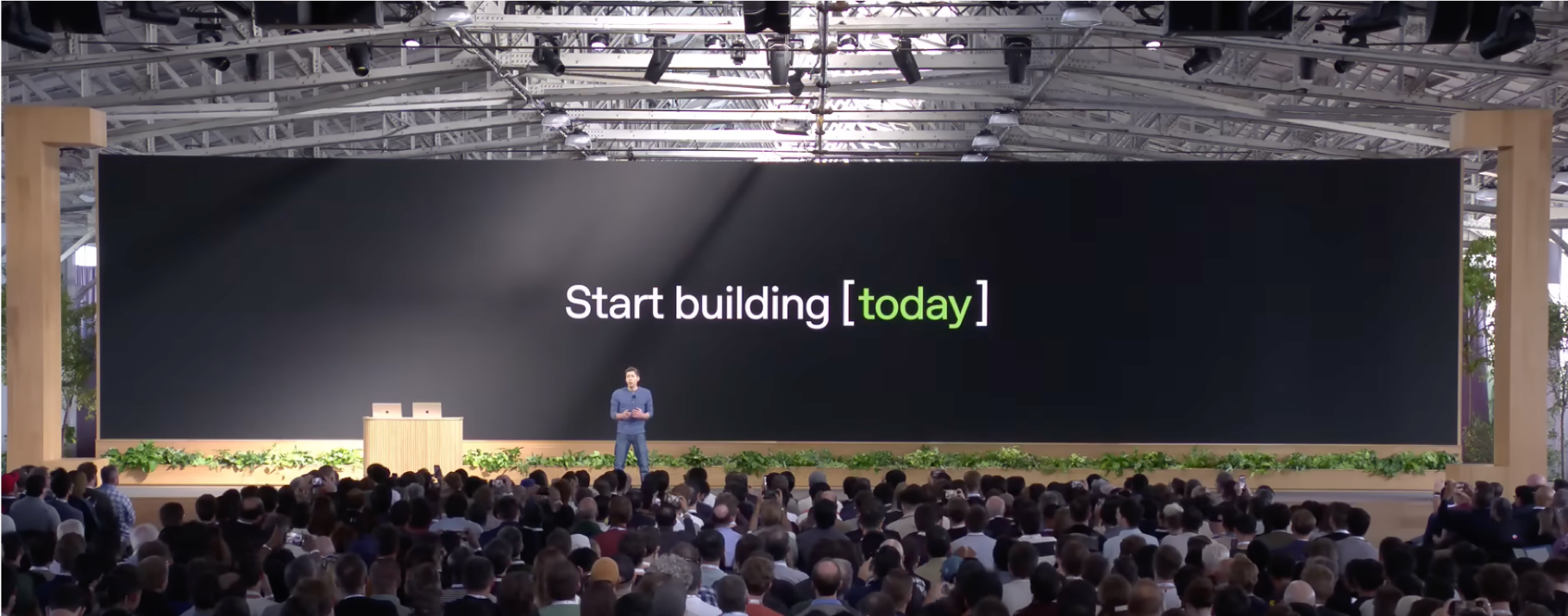OpenAI DevDay and the AI Economy


There is a lag between the moment when a technology becomes exciting, and the moment it explodes to deliver transformative gains through monetization and market creation.
In the current cycle of AI development, we are rapidly approaching the moment where potential energy turns kinetic.
AI is already moving at unprecedented speed, and this week OpenAI sent an important signal that the inflection point will be here much sooner than we think. At OpenAI DevDay, the trailblazing company put new tools into the hands of developers that will recast ChatGPT as a place to build apps and agents, not just use them.
Many have talked about AI’s potential to transform the economy. But the true promise of this technology will be unlocked when AI is an economy of its own. DevDay suggested that AI’s App Store moment is just around the corner. Let’s take a look at how OpenAI is laying the foundation.
The AI Economy
AI is moving incredibly quickly, and much faster than past cycles. AI startups are generating money faster, according to Stripe. The technology is moving so quickly that those startups have compressed what used to be three-year plans into quarterly look-aheads, Perplexity CEO Aravind Srinivas told Harvard Business School.
Despite this tireless march ahead, however, an AI economy that leverages technology to create completely new markets is still in its earliest innings. That is because we don’t yet have a marketplace. In each era of technology, leaders succeed by creating their own ecosystems for people to build, create, and transact inside their environment.
In the internet era, it was Amazon, eBay, and PayPal building on top of browser and payment advances.
In the cloud era, companies like Salesforce and Shopify leveraged the SaaS model to put enterprise capabilities into the hands of small and medium-sized businesses.
In the mobile era, Apple’s App Store forged a generation of disruptors that reached across nearly every consumer category.
AI doesn’t have its own value-creation ecosystem or a marketplace, yet. But DevDay signaled that OpenAI is moving the pieces into place.
A New Generation of AI Apps
Apps were the major driving force of the mobile era, allowing developers to launch new capabilities quickly that in turn increased the value of a smartphone. While at Verizon, the partners at GRIT launched the first app store in the US, and set the business model in place for the economics of how developers got listed, got paid, and how they still split economics with app stores today.
At DevDay, OpenAI unveiled tools that will put capabilities to build an entirely new generation of apps in ChatGPT.
Crucially, ChatGPT apps recontextualize the idea of “interactive” for the AI era. Users can access apps inside of a chat, and direct the app to perform a complex task using natural language. ChatGPT will also play the role of curator, providing in-chat recommendations for certain third-party tools when they are flagged as useful.
Only certain apps are available initially, but OpenAI is taking steps to empower developers to quickly expand the roster. The company also announced preview availability of AppsSDK, a software development kit built on the open-standard Model Context Protocol (MCP) that will help people build their own apps. This is an invitation to developers to build apps that increase the functionality and value of ChatGPT. It is the groundwork for a new ecosystem to take hold. But that wasn’t the only release of the day.
From Apps to Agents
One of the revolutionary developments of the AI era has been the advent of agents that can autonomously navigate workflows, analyze information, make decisions, adapt, and complete tasks. This opens up new workflows, where humans and agents are truly working side-by-side, and independently.
Agents require their own set of tools, so it is fitting that OpenAI unveiled a toolbox to make it easier to create, manage, and embed agents into products. AgentKit is geared toward making the agentic experience easier. It includes a “visual canvas” that provides visibility across stakeholder groups and specific tools for embedding agents into chat experiences. As with apps, OpenAI is handing developers tools and access not just to use agents, but to create them. This is the path toward new economic models.
Toward the AI Marketplace
You can’t build a marketplace on developer kits alone, but ChatGPT may be on its way there.
Think about a farmer’s market. you have to acquire the space to sell and set up the stalls. But you also need stuff to sell, and that comes from the vendors. To attract the vendors, you need to make it easy for them to set up a stall, and make it attractive to sell. So you give them the incentive to do so. Knowing the vendors need to retain the lion’s share of the revenue, that is what we established with the 70/30 revenue split back in 2002.
With app and agent kits, ChatGPT is providing the space to build, and tools to incent developers to build. You don’t have to squint too hard to see the means to trade, transact, and increase visibility coming around the corner. Eventually, developers will notice patterns in how users get value from their apps and agents, and in turn they will want to make money from the apps and agents they create, and see the advantage of improving their position in the marketplace. Then you have a marketplace, and monetization follows all of it.
The AI marketplace may look different than Amazon or the App Store, but it will change everything when it arrives. Given the pace of AI development, it is likely to be here faster than we think.
